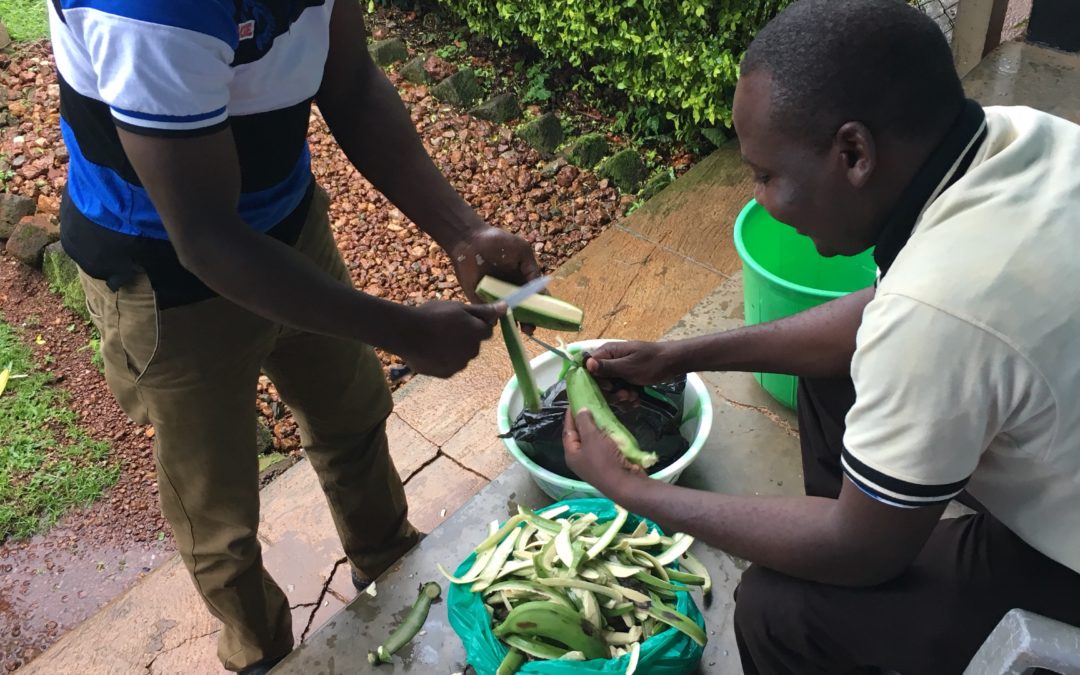
by Jessica Hughes | Apr 11, 2018 | Uganda
Over the last couple years, my discipleship group has become accustomed to an end of semester party. When we were studying the 39 Articles, we dubbed it the 40th Article. This semester, we studied spiritual disciplines, so we called it the Discipline of Fellowship.
Brian and Saul wanted to make matooke, the staple food for the Baganda, and fish. All I had to do was provide the kitchen and tea after. Sounds like a win! I had no idea how matooke was made, and was very interested to learn.
Brian brought over the matooke, fish, and spices (vegetables to make the sauce: tomatoes, onions, and green pepper). Then he started peeling the matooke. My knives have never had such a workout. Saul came and joined in the work, and soon enough, they were done.
Brian moved to the kitchen and began to work on the fish and sauce, while Saul continued with the matooke. He had retrieved some banana leaves and banana bark, and he placed the latter in a bowl crosswise, then a few banana leaves. Then he added the matooke. I was convinced it would never fit, but he proved me wrong. He then added more leaves, then tied it all tightly with the bark.


Saul then cut the spines of the banana leaves and some of the trunk so that the matooke wouldn’t touch the bottom of the pan. He added water, and voila! A matooke steam bath was born.

Now the matooke (in the pan we borrowed from the guest house because I don’t have a pan large enough) went in the stove to steam away. It eventually received another bowl as topper to trap the steam.

Brian continued to work on the fish and sauce, kicking me out of my own kitchen when I tried to help. Twice.



When the matooke had steamed enough (they kept pressing the leaves to see how soft it was), they removed it from the sauce pan, then took other leaves and mashed (though I think the proper term is “pressed”) it, working quickly because it was hot. Then it got re-wrapped for more steaming.


When it was finished, Saul then used a plate to scoop and serve, and we all enjoyed tremendously.



And out of that huge bunch of matooke (which fed 18 people) only this remained, which I gave to Saul.

Thanks be to God!
Related
by Jessica Hughes | Apr 2, 2018 | Uganda
As I was tackling the mountain for marking, I came across this gem from one of my MDiv students in an assignment about the Day of Atonement:

It gave me a good chuckle, as did the “unusual liturgical actions.” I am quite strict about plagiarism, and I thought this was his way of paraphrasing something he read. I was all kinds of proud of him for incorporating what I taught him.
Until I read the same sentence three papers later. Sadly, it’s a quote from a commentary.
So the plagiarism/attribution rants shall continue.
Related
by Jessica Hughes | Mar 24, 2018 | Uganda
We have reached the end of the semester, thanks be to God. However, this also means that I have some marking to do.

So, I have about two inches of papers to mark, plus the 17 assignments that were submitted via email.
I also have a lot of coffee. Thanks be to God.
Related

by Jessica Hughes | Feb 27, 2018 | Uganda
I love the digressions our class discussions can take. While discussing the Holiness Code in Leviticus 17-27 with my Masters of Divinity students, we were discussing what was meant in Leviticus 18:8, and how it differs from Leviticus 18:7. This led to a small discussion on various marriage customs in Uganda, particularly with regard to giving another girl in the marriage to help at home.
How “help” is defined in this situation is still a bit fuzzy to me, as the discussion devolved a wee bit as students from different tribes took exception to how others were defining it. One student raised his voice, and began, “Now, Reverend, I am a Muganda, and we – ” to which I replied, “I am also a Muganda, though adopted.”
Apparently this was enough to derail the discussion, because someone asked what my Luganda name is. I have two: I was given Nakalema years ago, and last semester, a student gave me Nasuuna. So I explained this. The class was quiet as they digested this, and I leaned over to a Rwandan student who was sitting in the front row and whispered, “This means that I’m a princess.” He looked at me with some skepticism.
However, this was confirmed when one of the Baganda said, “Those are royal names.” Indeed they are; names must be appropriate for the clan to which you belong. And since I belong to one of the royal clans (Lion), I can have a royal name. Amen.
I explained that I’ve been given names from several areas in East Africa, which I wear as badges of honor. From the Luo in Kenya, I am Achieng (born at midday). One of the Kenyan students in class was delighted to hear this, and said he will call me this from now on. The Bunyoro give pet names, and one of our professors named me Abwooli (clean, or cat), and one of the Munyoro students has already adopted it. From the Muyankole, I am Mbabazi (Grace).
And all this from a discussion of the Holiness Code.
Related

by Jessica Hughes | Jan 4, 2018 | Uganda
During the holidays in Uganda, messages fly fast and furious – wishing a Merry Christmas, a Happy New Year, and many other felicitations. Images and memes were thrown across WhatsApp and Facebook Messenger like confetti, thanks to cheap and easy bulk messaging.
However, last night, two of our graduates called to wish me a happy new year. This is somewhat unusual, as 1. a phone call is paid by only the initiator (not the recipient), and 2. they both graduated about a year and a half ago, so they are in my rear view mirror, and my focus is on the approximately 150 students in front of me. Regardless, it was a delightful surprise.
The larger surprise, though was that they both essentially said the same thing: they gave me a short update on the family and on the ministry, then both thanked me for all I did for them in their ministerial formation. One of them was, shall we say, a bit more of a trying student, so his words were especially sweet.
Of course, both phone calls were a tremendous encouragement. The students are arriving for the semester, lectures begin on Monday, and I am already stressed by what I know is coming, never mind what I don’t know is coming. As much as I love ministerial formation, it takes the lion’s share of time, both administratively and interactively, and of course, it never ends. They reminded me to take a deep breath, cling to Jesus, and soldier on. Amen.
Related


















